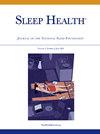Understanding sleep health in Black American adults: A qualitative analysis of barriers, facilitators, and perspectives on sleep interventions
IF 3.4
2区 医学
Q2 CLINICAL NEUROLOGY
引用次数: 0
Abstract
Objectives
Black Americans have a high prevalence of poor sleep health. Understanding their perceptions about sleep could identify determinants of poor sleep in this population and inform culturally tailored interventions. However, qualitative data are lacking. Using focus groups, we assessed Black American adults’ sleep perceptions, facilitators/barriers to sleep, beliefs about sleep recommendations, and perspectives on sleep interventions.
Methods
Participants (N = 36) attended online focus groups to discuss their perceptions and knowledge about sleep. A semistructured discussion guide was used to direct the conversation. Focus group data were transcribed and analyzed using a rapid analytic approach to identify themes.
Results
Mean age of participants was 34 (SD = 13.1) years, and 64% identified as women. Women and men slept less than the recommended hours of sleep (average sleep duration of 6.4 and 6.9 hours, respectively). Most participants defined healthy sleep as quality over quantity and viewed sleep as an important contributor to health and well-being. Exercise, limiting screen time, and suitable sleep environments were common perceived healthy sleep facilitators. Some participants misperceived electronic use and cosleeping, maladaptive strategies to cope with stress, as facilitators. Stress, responsibilities, electronic use, and unsuitable sleep environments were barriers. Participants wished to obtain personalized, racially tailored healthy sleep recommendations through highly accessible modes of dissemination (e.g., social media, websites).
Conclusions
The findings suggest study participants valued quality sleep. However, stress, responsibilities, and sleep-hindering behaviors may contribute to poor sleep health. Targeting stress reduction, healthy sleep behaviors, and disseminating racially tailored information through accessible modes may be useful sleep intervention strategies in this community.
了解美国黑人成年人的睡眠健康:睡眠干预障碍、促进因素和观点的定性分析。
目标:美国黑人睡眠质量差的发病率很高。了解他们对睡眠的看法可以找出导致这一人群睡眠质量差的决定性因素,并为采取符合其文化背景的干预措施提供依据。然而,目前还缺乏定性数据。通过焦点小组,我们评估了美国黑人成年人的睡眠观念、睡眠的促进因素/障碍、对睡眠建议的信念以及对睡眠干预措施的看法:参与者(36 人)参加了在线焦点小组,讨论他们对睡眠的看法和了解。讨论采用半结构化讨论指南进行引导。采用快速分析方法对焦点小组数据进行转录和分析,以确定主题:参与者的平均年龄为 34(SD=13.1)岁,64% 为女性。女性和男性的睡眠时间均少于建议睡眠时间(平均睡眠时间分别为 6.4 小时和 6.9 小时)。大多数参与者对健康睡眠的定义是质量重于数量,并认为睡眠是促进健康和幸福的重要因素。运动、限制屏幕时间和适宜的睡眠环境是常见的健康睡眠促进因素。一些参与者误认为电子产品的使用和同床共枕是应对压力的不良策略。压力、责任、使用电子产品和不适宜的睡眠环境则是障碍。参与者希望通过高度便捷的传播方式(如社交媒体、网站)获得个性化的、针对不同种族的健康睡眠建议:研究结果表明,研究参与者重视优质睡眠。然而,压力、责任和妨碍睡眠的行为可能会导致睡眠质量低下。针对减压、健康睡眠行为以及通过无障碍模式传播针对不同种族的信息,可能是该社区有用的睡眠干预策略。
本文章由计算机程序翻译,如有差异,请以英文原文为准。
求助全文
约1分钟内获得全文
求助全文
来源期刊

Sleep Health
CLINICAL NEUROLOGY-
CiteScore
6.30
自引率
9.80%
发文量
114
审稿时长
54 days
期刊介绍:
Sleep Health Journal of the National Sleep Foundation is a multidisciplinary journal that explores sleep''s role in population health and elucidates the social science perspective on sleep and health. Aligned with the National Sleep Foundation''s global authoritative, evidence-based voice for sleep health, the journal serves as the foremost publication for manuscripts that advance the sleep health of all members of society.The scope of the journal extends across diverse sleep-related fields, including anthropology, education, health services research, human development, international health, law, mental health, nursing, nutrition, psychology, public health, public policy, fatigue management, transportation, social work, and sociology. The journal welcomes original research articles, review articles, brief reports, special articles, letters to the editor, editorials, and commentaries.
 求助内容:
求助内容: 应助结果提醒方式:
应助结果提醒方式:


